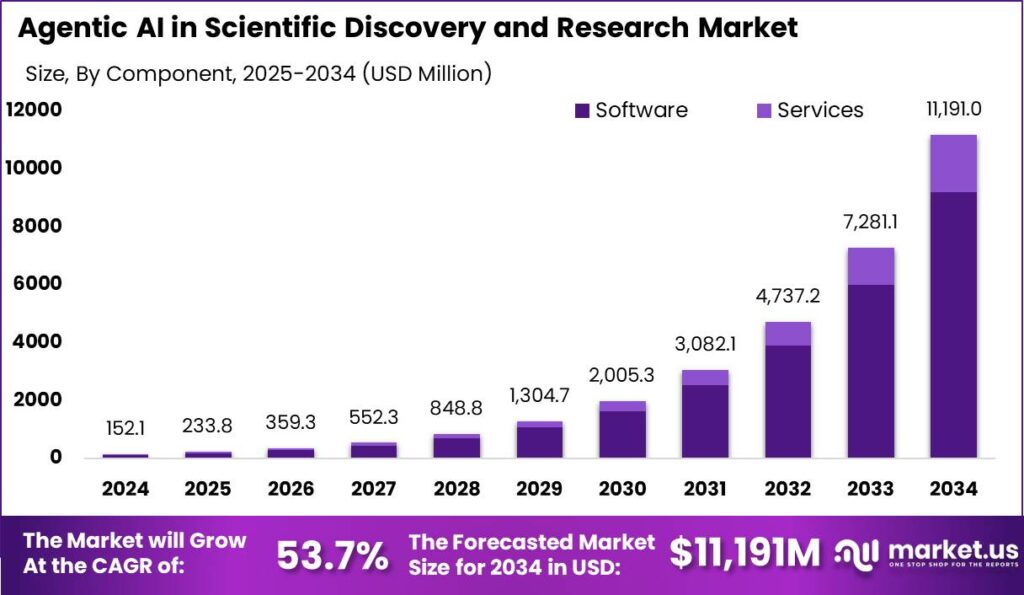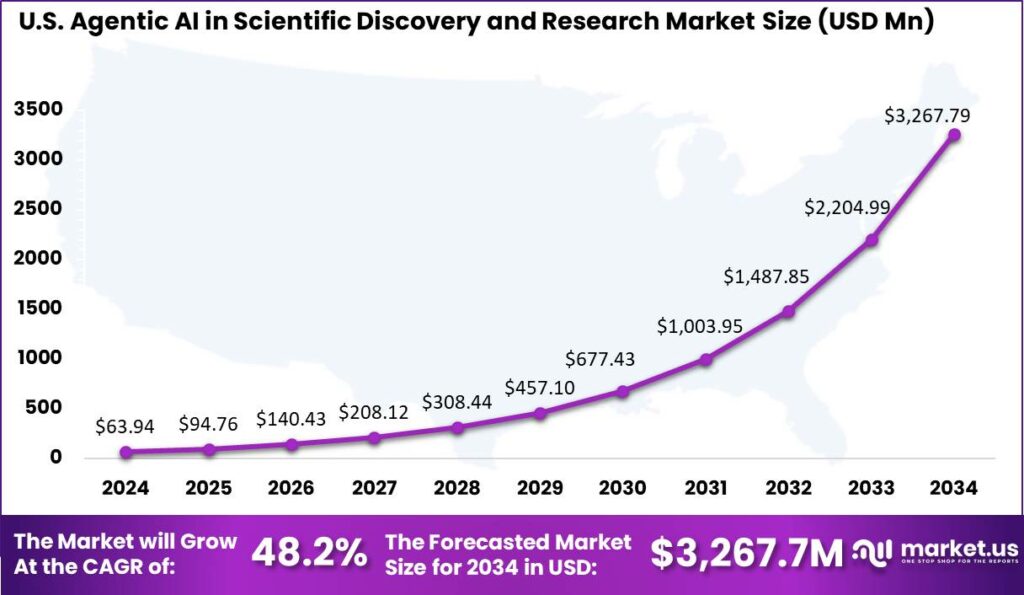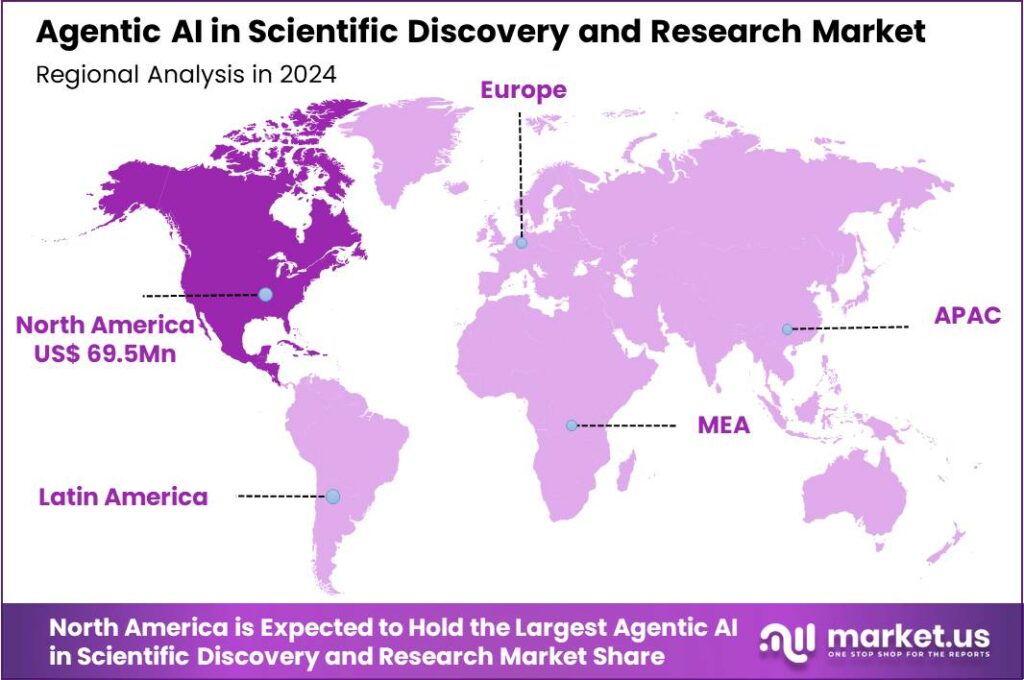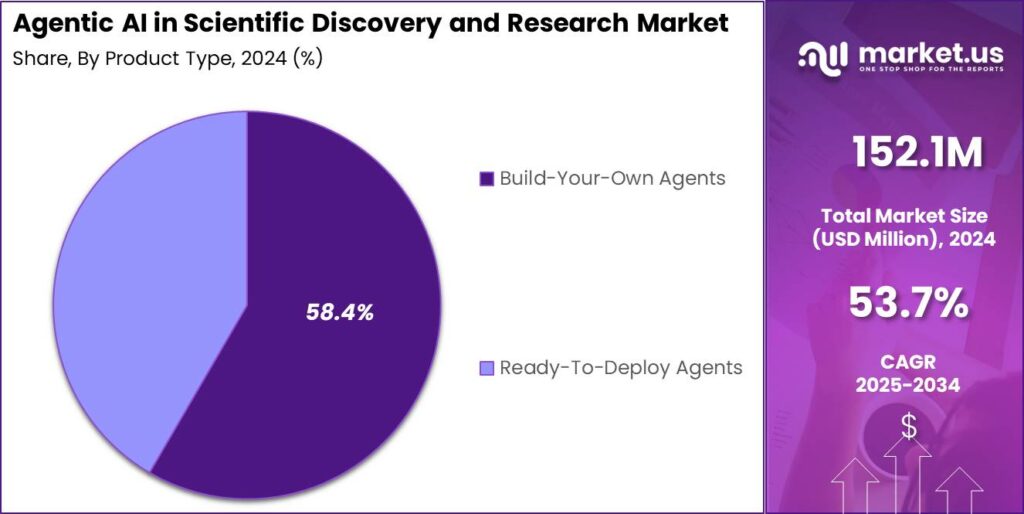Global Agentic AI in Scientific Discovery & Research Market Size, Share Analysis Report By Component (Software, Services), By Deployment Model (On-Premises, Cloud-Based), By Product Type (Ready-To-Deploy Agents, Build-Your-Own Agents), By Industry Vertical (Healthcare and Pharmaceuticals, IT & Telecom, Manufacturing, Others), Region and Companies - Industry Segment Outlook, Market Assessment, Competition Scenario, Trends and Forecast 2025-2034
- Published date: Feb. 2025
- Report ID: 140242
- Number of Pages: 368
- Format:
-
keyboard_arrow_up
Quick Navigation
- Report Overview
- Key Takeaways
- U.S. Market Size and Growth
- Analysts’ Viewpoint
- Component Analysis
- Deployment Mode Analysis
- Product Type Analysis
- Industry Vertical Analysis
- Key Market Segments
- Driver
- Restraint
- Opportunity
- Challenge
- Growth Factors
- Emerging Trends
- Business Benefits
- Key Regions and Countries
- Key Players Analysis
- Recent Developments
- Report Scope
Report Overview
The Agentic AI in Scientific Discovery & Research Market size is expected to be worth around USD 11,191.0 Million By 2034, from USD 152.1 Million in 2024, growing at a CAGR of 53.7% during the forecast period from 2025 to 2034. In 2024, North America held a dominant market position, capturing more than a 45.7% share, holding USD 69.5 Million revenue.
The market for Agentic AI in scientific discovery and research is expanding as more organizations leverage these technologies to enhance their research capabilities. This growth is driven by the increasing demand for faster and more accurate research outcomes, alongside the exponential growth in data generated by scientific studies.
Organizations are investing in Agentic AI to gain competitive advantages, such as reduced time to market for new discoveries and the ability to tackle complex scientific challenges. This market is not only expanding due to the increasing complexity and volume of scientific data but also because of the pressing need for more rapid and precise research outcomes in sectors like healthcare, pharmaceuticals, and environmental science.

The primary drivers of the agentic AI market include the relentless advancement of machine learning algorithms, the exponential growth of data in scientific research, and the pressing need for faster and more efficient research outcomes. The capability of agentic AI to perform autonomous data analysis and complex decision-making processes significantly reduces the time researchers need to spend on routine tasks, thereby accelerating the pace of scientific innovation.
A recent study in Nature highlights a game-changing impact of AI in scientific research, revealing that AI-driven methods can slash the time to discovery by up to a staggering 70%, particularly in fields like physics and biology. This is a monumental shift in how we approach complex problems. One prime example is DeepMind’s AlphaFold, which cracked the 50-year-old protein folding mystery in just a matter of months, a breakthrough that would have taken traditional research teams decades.
Key Takeaways
- The global market for Agentic AI in Scientific Discovery and Research is projected to reach USD 11,191.0 Million by 2034, up from USD 152.1 Million in 2024. This growth represents a CAGR of 53.7% during the forecast period from 2025 to 2034.
- In 2024, North America held a leading market position, commanding 45.7% of the global market share, with a revenue of USD 69.5 Million.
- Within North America, the US market size was recorded at USD 63.94 Million in 2024, reflecting a CAGR of 48.2%.
- The software segment led the market in 2024, capturing a dominant share of 82.4%.
- Regarding deployment models, the cloud-based deployment model accounted for 59.1% of the market share in 2024, indicating a preference for flexible, scalable, and cost-effective AI solutions.
- Additionally, the Build-Your-Own Agents segment took the largest share of the market, representing 58.4% of the total market share.
- The Healthcare and Pharmaceuticals sector emerged as the largest contributor to the market, holding 41.2% of the total market share in 2024.
U.S. Market Size and Growth
The US Agentic AI in Scientific Discovery & Research Market size was exhibited at USD 63.94 Million in 2024 with CAGR of 48.2%. The United States is leading in the agentic AI sector, particularly in scientific discovery and research, due to several strategic advantages that combine to create a fertile environment for AI innovation and application.
Firstly, the presence of major tech companies and startups that are pioneers in AI technology provides a strong technological foundation. Companies like Google, IBM, and Amazon are at the forefront, not only advancing AI technologies but also creating a favorable environment for rapid deployment of agentic AI solutions.
Moreover, the U.S. benefits from significant investments in research and development, backed by both private and public funding. This includes substantial investments from leading tech firms and support from government agencies like the National Science Foundation and the Defense Advanced Research Projects Agency, which facilitate cutting-edge research and development in AI.
Additionally, the U.S. hosts a robust academic sector that collaborates closely with the industry to drive AI innovation. This collaboration is crucial as it not only spurs technological advancements but also prepares a skilled workforce capable of pushing the boundaries of what AI can achieve. This synergy between academia and industry ensures continuous innovation and maintains the U.S.’s competitive edge in the global AI market.

In 2024, North America held a dominant market position, capturing more than a 45.7% share of the global agentic AI in scientific discovery and research market, generating a revenue of USD 69.5 Million. This leadership can be attributed to several factors that make the region an ideal hub for AI innovation.
North America benefits from a concentration of world-class research institutions, top-tier tech companies, and substantial government support. Agencies such as the National Science Foundation (NSF) and private-sector investments are key enablers of this growth, fueling both the development and application of agentic AI technologies in research.
The region’s strong focus on technology and innovation, coupled with a highly skilled workforce, positions it as a leader in the AI space. Additionally, North America’s healthcare, pharmaceutical, and energy sectors are rapidly adopting AI-driven solutions, creating an ecosystem ripe for growth. Universities and companies, like those in Silicon Valley, are working together to push the boundaries of AI, with many AI-driven scientific research applications focusing on drug discovery, climate modeling, and advanced materials.
Moreover, government policies in North America are highly conducive to the expansion of agentic AI. In the U.S., there is a growing emphasis on fostering AI talent, and initiatives such as Project Stargate, which involves major investments by firms like OpenAI and Oracle, highlight the region’s commitment to leading AI advancement. These efforts are driving breakthroughs that are applicable across industries, particularly in scientific discovery, where real-time decision-making and automation are becoming critical.

Analysts’ Viewpoint
As the reliance on agentic AI grows, so does the investment in its development, with significant opportunities emerging in the customization of AI agents for specific scientific tasks. However, with these opportunities come risks, particularly related to the security and integrity of AI systems. Agentic AI systems, like all AI technologies, are susceptible to adversarial attacks that could compromise their functionality and reliability.
The potential for these technologies to act independently also raises ethical and regulatory concerns, particularly about the decisions they make and their consequences in critical research areas. Thus, while the investment opportunities are vast, they must be approached with a nuanced understanding of the associated risks and regulatory challenges.
Technological advancements in agentic AI are continually broadening its applicability and effectiveness in research settings. Innovations in natural language processing and machine learning are particularly impactful, enabling AI agents to understand and process complex scientific literature and data more effectively than ever before.
The regulatory landscape for agentic AI in scientific research is evolving, as policymakers strive to keep pace with technological advancements. Regulations are being developed to address the unique challenges posed by autonomous AI systems, including issues of accountability, transparency, and ethical use. Ensuring that agentic AI systems adhere to established scientific and ethical standards is crucial for maintaining trust in the research outcomes they help generate.
Component Analysis
In 2024, the software segment of the agentic AI in scientific discovery and research market held a dominant position, capturing more than a 82.4% share of the market. This dominance is largely driven by the increasing demand for advanced software solutions that enable autonomous data processing, real-time decision-making, and enhanced data analysis in scientific research.
Software solutions provide the backbone for AI-driven research activities, as they integrate with existing research systems and automate complex processes like data mining, pattern recognition, and hypothesis generation. The rapid growth of the software segment can be attributed to its ability to deliver scalability, flexibility, and cost-efficiency for researchers.
With the ability to handle vast datasets, AI software solutions have become indispensable in fields such as genomics, drug discovery, and environmental research, where large-scale data analysis is critical. Furthermore, the rise of cloud computing and Software-as-a-Service (SaaS) models has made advanced AI tools more accessible to research institutions of all sizes, driving further adoption.
Another key factor contributing to the growth of the software segment is the constant advancements in machine learning (ML) and deep learning algorithms. These AI technologies are continuously evolving to provide more accurate predictions and faster results. As a result, scientific teams can focus more on innovative research rather than spending time on routine analysis, which has helped accelerate scientific discovery.
Overall, the software segment will likely continue to lead the agentic AI market due to its critical role in enabling the advanced functionalities needed for modern scientific research. As AI algorithms become more sophisticated and integrated with emerging technologies like quantum computing, software will remain at the forefront, powering the next generation of scientific breakthroughs.
Deployment Mode Analysis
In 2024, the cloud-based deployment model for agentic AI in scientific discovery and research captured 59.1% of the market share, reflecting a clear shift toward flexible, scalable, and cost-effective AI solutions. Cloud-based platforms offer significant advantages for researchers by providing on-demand access to powerful computational resources and data storage without the need for expensive, on-premise infrastructure.
This is particularly critical in fields like genomics, drug discovery, and environmental research, where the sheer volume of data generated requires substantial processing power. The widespread adoption of cloud-based AI solutions is driven by several factors. First, the scalability offered by cloud platforms allows research institutions to easily scale their AI applications as their needs grow.
Whether it’s handling larger datasets, expanding the scope of research projects, or incorporating more advanced AI models, cloud infrastructure can accommodate these demands without major capital investments. Additionally, cloud solutions enable collaborative research by allowing scientists from different locations to access the same tools and data in real-time, thereby accelerating the pace of discovery.
Security and compliance have also improved significantly in cloud environments, with many cloud service providers offering specialized features designed to meet the stringent data protection and regulatory requirements of the healthcare, pharmaceutical, and research sectors. These advancements in security and data privacy are essential as the use of sensitive data in AI research continues to rise.
Product Type Analysis
In 2024, the Build-Your-Own Agents segment for agentic AI in scientific discovery and research dominated the market, capturing 58.4% of the total market share. This trend reflects the growing preference for customizable AI solutions that allow research organizations to design agents tailored specifically to their unique research needs and objectives.
By enabling the development of bespoke AI systems, this product type empowers institutions to address specialized challenges, from data analysis to hypothesis generation, with greater precision and control. The appeal of build-your-own agents lies in their flexibility. Researchers can integrate these agents into their existing workflows, enabling them to harness specific functionalities, such as real-time data processing, pattern recognition, in a way that directly aligns with the goals of their studies.
This flexibility allows organizations to adjust their AI systems as their research evolves, which is particularly important in fast-moving fields like drug discovery and genomics, where new data and methodologies constantly emerge. Moreover, the availability of advanced machine learning frameworks and development tools has made it easier than ever for researchers and AI developers to create highly specialized agents.
With platforms offering pre-built modules and customizable features, even organizations without deep in-house AI expertise can build powerful agentic systems. These user-friendly environments allow researchers to focus on solving scientific problems rather than managing the underlying complexity of AI development, driving broader adoption across diverse research fields.

Industry Vertical Analysis
In 2024, the Healthcare and Pharmaceuticals sector held the largest share of the agentic AI in scientific discovery and research market, accounting for 41.2% of the total market. This dominance can be attributed to the increasing integration of AI technologies in drug development, diagnostics, and personalized medicine, where the need for high precision and accelerated timelines is critical.
Healthcare and pharmaceutical companies are leveraging agentic AI to enhance their research processes, improve clinical outcomes, and streamline operations, making this vertical a key driver of growth in the market. One of the main factors behind the sector’s leading position is the significant volume of data generated within healthcare and pharmaceutical research.
AI systems, particularly agentic AI, are invaluable in analyzing complex datasets, such as medical records, genomic sequences, and clinical trial results, to identify patterns that would be difficult for humans to discern. This ability to autonomously process and analyze vast amounts of data speeds up the discovery of new treatments, drug formulations, and therapies, resulting in more efficient research pipelines.
Additionally, AI is playing a transformative role in personalized medicine, where agents can help develop more tailored treatment plans for patients based on their unique genetic makeup and health data. Agentic AI’s ability to make autonomous decisions based on this data accelerates the move towards precision medicine, which aims to offer more effective and targeted therapies. This shift is especially important in areas like oncology and rare diseases, where traditional treatment approaches may not be effective for all patients.
Key Market Segments
By Component
- Software
- Services
By Deployment Mode
- On-Premises
- Cloud-Based
By Product Type
- Ready-To-Deploy Agents
- Build-Your-Own Agents
By Industry Vertical
- Healthcare and Pharmaceuticals
- IT & Telecom
- Manufacturing
- Others
Driver
Accelerating the Pace of Scientific Breakthroughs
The primary driver behind the adoption of agentic AI in scientific research is its potential to dramatically accelerate the pace of discoveries. Traditional research methods often involve time-consuming processes like literature reviews, data analysis, and hypothesis generation. Agentic AI systems can perform these tasks at superhuman speeds, allowing researchers to focus on higher-level thinking and creative problem-solving.
For instance, in the field of drug discovery, agentic AI is already making waves. These systems can analyze vast amounts of data, predict molecular interactions, and even suggest novel compounds for testing. This capability is not just theoretical – it’s yielding real results. In 2024, researchers at the University of Pennsylvania used AI to discover nearly a million new antibiotics. This kind of breakthrough would have taken years, if not decades, using conventional methods.
Restraint
Ethical Concerns and Regulatory Hurdles
While the potential of agentic AI in scientific research is immense, ethical concerns and regulatory challenges act as significant restraints on its widespread adoption. As these AI systems become more autonomous in their decision-making, questions arise about accountability, transparency, and the potential for unintended consequences.
One of the primary ethical concerns is the risk of AI systems making decisions that conflict with human values or interests. In scientific research, where the stakes can be incredibly high, this misalignment could lead to harmful outcomes. For instance, an AI system focused solely on efficiency might suggest experimental designs that overlook important safety considerations or ethical guidelines.
Opportunity
Democratizing Advanced Research Capabilities
Agentic AI presents a remarkable opportunity to democratize access to advanced research capabilities, potentially leveling the playing field in scientific discovery. Traditionally, cutting-edge research has been the domain of well-funded institutions with access to expensive equipment and large teams of specialists. Agentic AI is changing this paradigm.
With AI-driven systems offering sophisticated analysis, hypothesis generation, and even experimental design, smaller research teams and institutions can now punch above their weight. This democratization could lead to a more diverse and inclusive scientific community, bringing fresh perspectives and ideas to the forefront. For example, a small university lab with limited resources could use agentic AI to conduct complex data analysis that would have previously required a supercomputer and a team of data scientists.
Challenge
Ensuring Human Oversight and Creativity
While agentic AI offers tremendous potential in scientific research, a significant challenge lies in maintaining the crucial role of human creativity and oversight. As AI systems become more autonomous, there’s a risk of over-reliance on machine-generated hypotheses and conclusions.
The danger here is twofold. First, AI systems, despite their sophistication, can make mistakes or overlook nuances that a human researcher might catch. Without proper human oversight, these errors could propagate through the scientific process, potentially leading to flawed conclusions or wasted resources.
Second, there’s a risk of stifling human creativity and intuition, which have been the source of many groundbreaking scientific discoveries throughout history. Striking the right balance between AI assistance and human insight is crucial. Researchers need to develop new skills to effectively collaborate with AI systems, understanding both their capabilities and limitations.
Growth Factors
The rapid adoption of agentic AI in scientific discovery and research is being fueled by several key factors. First and foremost is the technology’s ability to dramatically accelerate the pace of breakthroughs. Traditional research methods often involve time-consuming processes like literature reviews, data analysis, and hypothesis generation.
Agentic AI systems can perform these tasks at superhuman speeds, allowing researchers to focus on higher-level thinking and creative problem-solving. This acceleration is particularly evident in fields like drug discovery.
In 2024, researchers at the University of Pennsylvania used AI to discover nearly a million new antibiotics – a feat that would have taken years, if not decades, using conventional methods. This kind of rapid progress is not just exciting; it’s potentially life-saving.
Emerging Trends
As we look towards 2025 and beyond, several exciting trends are emerging in the use of agentic AI for scientific discovery and research. One of the most promising is the development of “orchestrator” bots. Companies like Microsoft are working on creating AI systems that can manage other autonomous agents, ensuring they’re all working efficiently towards a common goal. This could revolutionize how large-scale research projects are coordinated and executed.
Another significant trend is the shift from user-driven to contextual AI. Bob de Caux, head of AI at IFS, notes that we’re seeing a pivot towards AI systems that can quickly process vast reams of data and put forward helpful, contextual suggestions automatically. This is particularly valuable in fields like forecasting and simulations, where bringing together disparate data sources has traditionally been a complex and time-consuming process.
Business Benefits
The adoption of agentic AI in scientific research offers numerous benefits for businesses operating in this space. Perhaps the most significant is the potential for increased efficiency and productivity. By automating complex workflows and data analysis tasks, agentic AI frees up researchers to focus on high-value activities that require human creativity and critical thinking.
This efficiency boost translates directly to cost savings and faster time-to-market for new discoveries and innovations. In the pharmaceutical industry, for instance, agentic AI could significantly reduce the time and resources required to bring new drugs to market. This not only benefits the companies involved but also has the potential to accelerate the delivery of life-saving treatments to patients.
Key Regions and Countries
- North America
- US
- Canada
- Europe
- Germany
- France
- The UK
- Spain
- Italy
- Rest of Europe
- Asia Pacific
- China
- Japan
- South Korea
- India
- Australia
- Singapore
- Rest of Asia Pacific
- Latin America
- Brazil
- Mexico
- Rest of Latin America
- Middle East & Africa
- South Africa
- Saudi Arabia
- UAE
- Rest of MEA
Key Players Analysis
The Agentic AI in Scientific Discovery & Research Market has seen substantial growth in recent years, with several key players driving innovation through acquisitions, mergers, and the launch of new products.
IBM has long been a leader in the integration of AI into scientific discovery. The company has made significant strides with its AI-driven platform, Watson, which is used across various industries, including healthcare and drug discovery. IBM’s continuous investments in research and development (R&D) ensure that their AI tools stay at the forefront of scientific advancements.
DeepMind, a subsidiary of Alphabet (Google’s parent company), is another key player driving AI in scientific discovery, particularly in life sciences and healthcare. DeepMind has made headlines with its work in protein folding, solving a longstanding problem in biology with the help of its AI system, AlphaFold.
Microsoft has made significant progress in the AI and research space through its Azure AI platform, which is being used to accelerate scientific discoveries across multiple fields. The company’s strategy involves partnerships with research institutions and pharmaceutical companies to harness the power of cloud computing and AI in areas such as genomics, drug discovery, and personalized medicine.
Top Key Players in the Market
- OpenAI, LLC
- DeepMind Technologies Limited
- IBM Corporation
- Microsoft Corporation
- NVIDIA Corporation
- Amazon Web Services, Inc.
- Anthropic, Inc.
- Scale AI, Inc.
- Cohere, Inc.
- DataRobot, Inc.
- Other Major Players
Recent Developments
- December 2024: Google launched Gemini 2.0, an AI model designed for the “agentic era.” It includes a new Deep Research feature that acts as a research assistant, exploring complex topics and compiling reports
- November 2024: Akira AI introduced new agentic AI tools for drug discovery, automating data analysis and optimizing clinical trials.
Report Scope
Report Features Description Market Value (2024) USD 152.1 Mn Forecast Revenue (2034) USD 11,191 Mn CAGR (2025-2034) 53.7% Base Year for Estimation 2024 Historic Period 2020-2023 Forecast Period 2025-2034 Report Coverage Revenue Forecast, Market Dynamics, COVID-19 Impact, Competitive Landscape, Recent Developments Segments Covered By Component (Software, Services), By Deployment Model (On-Premises, Cloud-Based), By Product Type (Ready-To-Deploy Agents, Build-Your-Own Agents), By Industry Vertical (Healthcare and Pharmaceuticals, IT & Telecom, Manufacturing, Others) Regional Analysis North America – US, Canada; Europe – Germany, France, The UK, Spain, Italy, Russia, Netherlands, Rest of Europe; Asia Pacific – China, Japan, South Korea, India, New Zealand, Singapore, Thailand, Vietnam, Rest of APAC; Latin America – Brazil, Mexico, Rest of Latin America; Middle East & Africa – South Africa, Saudi Arabia, UAE, Rest of MEA Competitive Landscape OpenAI LLC, DeepMind Technologies Limited, IBM Corporation, Microsoft Corporation, NVIDIA Corporation, Amazon Web Services Inc., Anthropic Inc., Scale AI Inc., Cohere Inc., DataRobot Inc., Other Major Players Customization Scope Customization for segments, region/country-level will be provided. Moreover, additional customization can be done based on the requirements. Purchase Options We have three license to opt for: Single User License, Multi-User License (Up to 5 Users), Corporate Use License (Unlimited User and Printable PDF)  Agentic AI in Scientific Discovery & Research MarketPublished date: Feb. 2025add_shopping_cartBuy Now get_appDownload Sample
Agentic AI in Scientific Discovery & Research MarketPublished date: Feb. 2025add_shopping_cartBuy Now get_appDownload Sample -
-
- OpenAI, LLC
- DeepMind Technologies Limited
- IBM Corporation
- Microsoft Corporation
- NVIDIA Corporation
- Amazon Web Services, Inc.
- Anthropic, Inc.
- Scale AI, Inc.
- Cohere, Inc.
- DataRobot, Inc.
- Other Major Players












